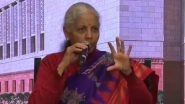New Delhi, Aug 22 (PTI) The finance ministry on Thursday said the dispute resolution and amnesty scheme to reduce legacy service tax and central excise cases will become operational for four months beginning September 1.
The most attractive aspect of the scheme -- Sabka Vishwas - Legacy Dispute Resolution Scheme, 2019 -- is that it provides substantial relief in tax dues for all categories of cases as well as full waiver of interest, fine and penalty, the ministry said in a statement.
In all these cases, there would be no other liability of interest, fine or penalty, and there is also a complete amnesty from prosecution, it added.
The scheme will become operational from September 1 and continue till December 31, 2019.
More than Rs 3.75 lakh crore is blocked in service tax and excise litigations.
The scheme, announced by Finance Minister Nirmala Sitharaman in her Budget speech, is especially tailored to free the large number of small taxpayers of their pending disputes with the tax administration, the ministry said.
For all the cases pending in adjudication or appeal, in any forum, the scheme offers a relief of 70 per cent from the duty demand if it is Rs 50 lakh or less, and 50 per cent if it is more than Rs 50 lakh.
"The same relief is available for cases under investigation and audit where the duty involved is quantified and communicated to the party or admitted by him in a statement on or before June 30, 2019," it said.
Further, in cases of confirmed duty demand, where there is no appeal pending, the relief offered is 60 per cent of the confirmed duty amount if the same is Rs 50 lakh or less, and 40 per cent if the confirmed duty amount is more than Rs 50 lakh.
In cases of voluntary disclosure, the person availing the scheme will have to pay only the full amount of disclosed duty, the ministry said.
The government expects the scheme to be availed by a large number of taxpayers for closing their pending disputes relating to legacy service tax and central excise cases.
Giving details, the ministry said there are two main components of the scheme -- dispute resolution and amnesty.
The dispute resolution component is aimed at liquidating the legacy cases of central excise and service tax that are subsumed in GST and are pending in litigation at various forums.
The amnesty component offers an opportunity to the taxpayers to pay the outstanding tax and be free of any other consequence under the law.
The statement further said that as the objective of the scheme is to free as large a segment of the taxpayers from the legacy taxes as possible, the relief given is substantial.
The scheme is especially tailored to free the large number of small taxpayers of their pending disputes with the tax administration.
Meanwhile, the Central Board of Indirect Taxes and Customs (CBIC) has fixed the monetary limits for the revenue department to file appeal at various dispute resolution forums, like CESTAT, high courts and the Supreme Court.
The monetary limit for filing appeal in CESTAT has been fixed at Rs 50 lakh, for high courts Rs 1 crore and for the Supreme Court at Rs 2 crore.
This, the CBIC said, is being done with a view to reduce government litigations.
(The above story is verified and authored by Press Trust of India (PTI) staff. PTI, India’s premier news agency, employs more than 400 journalists and 500 stringers to cover almost every district and small town in India.. The views appearing in the above post do not reflect the opinions of LatestLY)













 Quickly
Quickly


